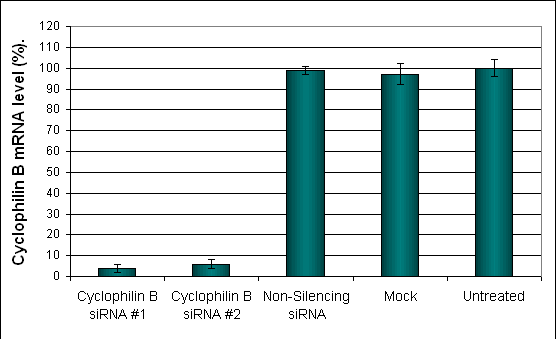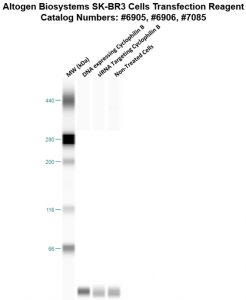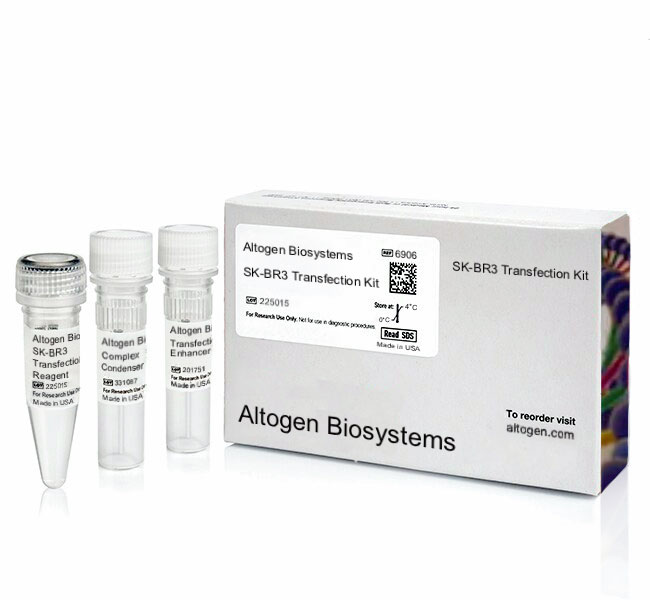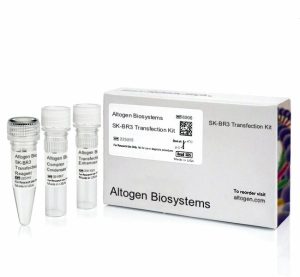Description
Purchase Orders: Click “Add to Cart” button to order, then email PO to orders@altogen.com.
Product Availability: In Stock.
Transfection Reagent for SK-BR3 Cells (Breast Adenocarcinoma Cells, HTB-30)
- Proprietary cationic lipids formulation
-
High transfection efficiency of small RNA (siRNA, shRNA, miRNA), mRNA, pDNA
-
Effective and robust intracellular delivery
-
Work in the presence of serum
-
Download in vitro SK-BR3 transfection protocol: [PDF]
- Download SK-BR3 CRISPR/Cas9 transfection protocol: [PDF]
- Download PowerPoint presentation for SK-BR3 cells transfection kit: [PPT]
- UPC/GTIN/EAN: 860002089799
-
Brand: ALTOGEN®, developed and manufactured by Altogen Biosystems
Transfection Efficiency:
Reagent exhibits at least 94% transfection efficiency of siRNA delivery. Transfection efficiency was determined by RT-PCR.
Product Description:
Transfection kit for SKBR3 cell line, a human breast cancer cells. Transfection reagent supplemented by complex condenser and transfection enhancer.
Transfection Protocol and SDS:
Download Altogen Biosystems SK-BR3 Transfection Protocol: [PDF]
Download SDS: [PDF]
SK-BR3 Cell Line:
SK-BR-3 is a breast cancer cell line that was derived from a metastatic tumor of a 43-year-old Caucasian female patient. The SK-BR-3 cell line is known to overexpress the human epidermal growth factor receptor 2 (HER2/neu) protein, which is a hallmark of approximately 20-25% of breast cancers. The SK-BR-3 cell line is commonly used in cancer research to study the mechanisms of HER2/neu-driven breast cancer and to develop new treatments for HER2-positive breast cancer. In particular, the SK-BR-3 cell line has been used to investigate the effectiveness of drugs that target the HER2 receptor, such as trastuzumab (Herceptin) and lapatinib (Tykerb). In addition to breast cancer research, the SK-BR-3 cell line has been used in studies on the molecular mechanisms of cancer metastasis and drug resistance. Breast cancer is considered the most common malignancy in females as well as a significant public health issue. The SK-BR-3 tumorigenic cell line was established in 1970 by G. Trempe and L. J. Old from the mammary gland of a 43-year-old Caucasian female with breast adenocarcinoma. The SK-BR-3 cells were derived from a metastatic site by pleural effusion. Many of these tumorigenic cells exhibit polyploidy or an increased number of chromosomes. The SK-BR-3 cell line is considered a hypertriploid cell line with a very complex chromosome composition. The HER2/c-erb-2 gene product is overexpressed, and the modal chromosome number of 84 occurs in approximately 34% of cells. The SK-BR-3 cell line includes microvilli and desmosomes as well as glycogen granules. The SK-BR3 cell line is useful for studying antibody resistance in some breast cancer cells. Altogen Biosystems provides high-efficiency transfection kits for this cell line.
Cell line mutations:
| PRPS1L1 | 221823 | 37 | 7 | 18067241 | 18067241 | Silent | SNP | G | A |
| MUC16 | 94025 | 37 | 19 | 9060904 | 9060904 | Missense_Mutation | SNP | C | T |
| TGFBR3 | 7049 | 37 | 1 | 92163651 | 92163651 | Missense_Mutation | SNP | G | A |
| B3GALT6 | 126792 | 37 | 1 | 1168525 | 1168525 | Silent | SNP | G | A |
| ACAP3 | 116983 | 37 | 1 | 1233314 | 1233314 | Splice_Site | SNP | C | A |
| NPHP4 | 261734 | 37 | 1 | 5923964 | 5923964 | Missense_Mutation | SNP | C | T |
| SLC25A33 | 84275 | 37 | 1 | 9642420 | 9642420 | Missense_Mutation | SNP | G | A |
| AKR7A3 | 22977 | 37 | 1 | 19611534 | 19611534 | Missense_Mutation | SNP | G | C |
| E2F2 | 1870 | 37 | 1 | 23848400 | 23848400 | Missense_Mutation | SNP | G | C |
| IFNLR1 | 163702 | 37 | 1 | 24484271 | 24484271 | Silent | SNP | C | G |
| SF3A3 | 10946 | 37 | 1 | 38444478 | 38444478 | Missense_Mutation | SNP | C | G |
| SZT2 | 23334 | 37 | 1 | 43913600 | 43913600 | Missense_Mutation | SNP | C | T |
| GNG5 | 2787 | 37 | 1 | 84971754 | 84971754 | Silent | SNP | G | C |
Data:

Figure 1. Cyclophilin B silencing efficiency was determined by qRT-PCR in the SKBR3 cells transfected by Cyclophilin B siRNA or non-silencing siRNA control following the recommended transfection protocol. Cyclophilin mRNA expression levels were measured 48 hours post-transfection. 18S rRNA levels were used to normalize the Cyclophilin B data. Values are normalized to untreated sample. Data are presented as means ± SD (n=6).

Figure 2. Protein expression of Cyclophilin B in SK-BR-3 cells. DNA plasmid expressing Cyclophilin B or siRNA targeting Cyclophilin B were transfected into SK-BR-3 cells following Altogen Biosystems transfection protocol. At 72 hours post-transfection the cells were analyzed by Western Blot for protein expression levels (normalized by total protein, 10 µg of total protein loaded per each well). Untreated cells used as a negative control.
Selected in vivo transfection product citations (ALTOGEN® IN VIVO Transfection Kits used in the following publications):
- 2008 454(7203):523-7. Innate immunity induced by composition-dependent RIG-I …Saito et al [PDF]
- Am J Pathology. 2010 177(4):1870-80. Role of ocular complement factor H in a murine model … Lyzogubov et al [PDF]
- Nature Biotechnology. 2011 29(4):341-5. Delivery of siRNA to the mouse brain by … Alvarez-Erviti et al [PDF]
- Cancer Research. 2011 71(15):5144-53. Inhibition of miR-193a expression by… Iliopoulos et al [PDF]
- 2010 16(11):2108-19. RNase L releases a small RNA from HCV RNA that refolds … Malathi et al [PDF]
- 2012 55(7):2069-79. The p47phox- and NADPH oxidase organiser 1 … Youn et al [PDF]
- British Journal of Cancer. 2012 107(3):516-26. TIGAR induces p53-mediated cell-cycle … Madan et al [PDF]
- 2014 63(2):353-61. Tissue transglutaminase contributes to … Liu et al [PDF]
- Circulation Research. 2010 15;107(8). Kruppel-like factor-4 transcriptionally regulates … Cowan et al [PDF]
- 2012 59(1):158-66. Role of uncoupled endothelial nitric oxide synthase … Gao et al [PDF]
- Jounal of Biological Chemistry. 2012 287(4):2907. Chaperoning of mutant p53 protein … Gogna et al [PDF]
- PLoS Pathogens. 2012 8(8) Uridine composition of the poly-U/UC tract of HCV RNA … Schnell et al [PDF]
- J Proteome Res. 2012(11) Retinal proteome analysis in a mouse model of oxygen-induced … Kim et al [PDF]
- 2011 141(2) Differential type I interferon-mediated autophagic trafficking … Desai et al [PDF]
- PLoS Pathog. 2014 10(10) Exosomes from hepatitis C infected patients transmit HCV … Bukong et al [PDF]
Altogen Biosystems manufacturers over 100 pre-optimized in vitro transfection kits for cancer cell lines and primary cells, elecroporation products, and tissue-targeted in vivo delivery reagents for life science research. Advanced formulation of reagents and optimized transfection protocols provide efficient intracellular delivery of protein, DNA, mRNA, shRNA and siRNA molecules. Read more about transfection technology at Altogen’s Transfection Resource. Altogen Labs provides safety and efficacy preclinical research services. GLP-compliant studies for IND applications, and drug development, including over 90 in-house validated xenograft models, safety toxicology, etc (visit AltogenLabs.com).
Volume Options:
- 0.5 ml (Catalog #6905)
- 1.5 ml (Catalog #6906)
- 1.5 ml CRISPR (Catalog #2192)
- 8.0 ml (Catalog #7085)
Purchase Orders: Click “Add to Cart” button to order, then email PO to orders@altogen.com.
Product Availability: In Stock.






